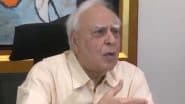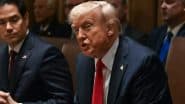Singapore, Apr 15 (PTI) Singapore has gone through and overcome many crises in the past, but the current global uncertainty caused by the US-imposed tariffs is unprecedented and will last a very long time, warned Senior Minister Lee Hsien Loong.
A supportive and stable external environment is no longer a given, stressed the former prime minister.
Also Read | Earthquake in California: Quake of Magnitude 5.2 on Richter Scale Jolts San Diego.
“Some people say ‘don't get excited, don't over blow the issue, we've weathered bigger storms before, we haven't failed',” said Lee, who was speaking at the National Trades Union Congress (NTUC) dialogue, which was attended by NTUC president K. Thanaletchimi, secretary-general Ng Chee Meng and other union leaders.
“We should take it in our own stride, but we do need to be concerned and to understand what is happening and what this means for us, because this time, something important is different,” The Straits Times quoted Lee as saying.
Also Read | Hungary's Parliament Passes Constitutional Amendment To Ban LGBTQ+ Public Events.
Lee said: “I hope that Singaporeans understand what is happening, what is at stake and what we must do together to secure our future.”
He noted how the city state has weathered the likes of the Asian financial crisis, Sars (severe acute respiratory syndrome) and, more recently, the Covid-19 pandemic, where the country has been able to “batten down (the) hatches and see it through”.
While Singapore has been able to emerge successfully before, it had done so in a climate where it had two things in its favour, namely the ability of the country to unite during turmoil; and a working global economic system that promoted the free flow of trade and a level playing field.
He said: “The free flow of investments encouraged MNCs (multinational corporations) to look for places to do business. We were efficient, we were doing well. We came out from trouble. We plugged back in. We could resume growing, resume developing, resume succeeding,” said the 73-year-old leader who served as the third Prime Minister of Singapore for two decades from 2004 to 2024.
With the sanctity of the global financial system and the World Trade Organisation in place, this gave countries big and small level-playing field, where the rules and market access were the same, he pointed out. This allowed Singapore to enjoy the same market access as bigger countries, and benefit from their bargaining power, thus giving it access to investments and jobs, he said.
However, the Singapore politics and economic veteran and senior most leader of the ruling People's Action Party (PAP) laid out how the US, with its new tariff regime, now wants to “dismantle the system” by replacing the MFN – or Most Favoured Nation – principle with reciprocal tariffs.
On April 9, US President Donald Trump announced a 90-day pause on reciprocal tariffs, with the exception of tariffs on China, which are currently at a staggering 145 per cent. This triggered retaliation from China, which raised its tariffs on American goods to 125 per cent, effective from April 12.
Trump later excluded electronics such as smartphones and laptops from the reciprocal tariffs.
The trade-finance-focused and export-oriented island state is still subject to the flat duty of 10 per cent that Trump placed on goods arriving from all foreign countries, which took effect on April 5.
Likening it to arm wrestling to see who has a stronger arm, Lee said this new regime involves the US “dealing with its partners one-on-one instead”, thus exploiting America's bargaining power as the country with a quarter of the world's gross domestic product, and a seventh of the total goods trade in the world.
“So, it's a fundamentally different kind of world which the US is looking for and pushing for, and the approach is not win-win, but win-lose,” he said. “In other words, the US wants to do well for themselves, (and) they really don't mind whether the other countries do well for themselves or not.”
He also noted Trump's call, saying: “If we can make a really fair deal and a good deal for the United States, not a good deal for the others, this is America first. It's now America first.”
“Small countries will suffer because we have no bargaining power, but even big countries will not do well because there is going to be a lot of confusion, a lot of uncertainties, a lot of differences in the rules, and far fewer opportunities to trade, to invest, to do business together,” noted the Senior Minister. Additionally, the tariffs “will choke off trade, raise costs and dampen growth”.
Despite the current 90-day reprieve on tariffs coming into effect, he noted how other countries will go tit-for-tat with the US, much like how China already has, and this, in turn, will be a burden on businesses, consumers and the global economy.
This is a problem that will persist, warned Lee whose ruling PAP, that has ruled Singapore ever since independence, is heading for General Election in the coming month.
“With all these new tariffs, this is something which is going to last a very long time. It's not going to go away soon, because once you put in a tariff, once you protect your market, it's very difficult to take it away,” he told unionists.
On the domestic front, global uncertainty has already had an impact. Earlier on April 14, the Ministry of Trade and Industry cut Singapore's growth forecast for 2025 to zero per cent to 2 per cent, a downgrade from the 1 per cent to 3 per cent range previously.
To address the economic uncertainties, including any impact on jobs, Prime Minister Lawrence Wong announced on April 8 the formation of a new task force to communicate with the private sector and devise strategies.
The task force is chaired by Deputy Prime Minister Gan Kim Yong and includes representatives from NTUC, the Singapore Business Federation and the Singapore National Employers Federation.
(This is an unedited and auto-generated story from Syndicated News feed, LatestLY Staff may not have modified or edited the content body)













 Quickly
Quickly

















